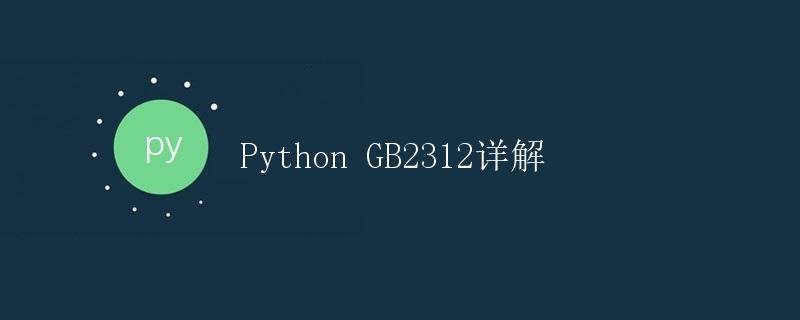Python GB2312 Detailed Explanation
Python GB2312 Detailed Explanation

1. Overview
GB2312 is the national standard for the Chinese character set encoding, a double-byte Chinese encoding. In Python, we can use the built-in gb2312 encoding module for string conversion and processing. This article will provide a detailed introduction to using GB2312 encoding in Python.
2. GB2312 Encoding and Decoding
2.1 Encoding
In Python, we can use the encode() method of the gb2312 module to convert a string to GB2312 encoding. The following is an example code:
# Example Code 1: Use the gb2312 encoding module to convert a string to GB2312 encoding
str = "你好"
encoded_str = str.encode('gb2312')
print(encoded_str)
Running result: b'xc4xe3xbaxc3'
2.2 Decoding
In Python, we can use the decode() method of the gb2312 module to convert a GB2312-encoded string to a Unicode string. The following is a sample code:
# Sample Code 2: Use the gb2312 encoding module to decode a GB2312-encoded string into a Unicode string
encoded_str = b'xc4xe3xbaxc3'
decoded_str = encoded_str.decode('gb2312')
print(decoded_str)
Running result: Hello
3. GB2312 Encoded Character Set
The GB2312 encoded character set includes most commonly used Chinese characters, as well as some special symbols and Latin letters. The following is a sample code that outputs some characters from the GB2312 coded character set:
# Example Code 3: Output some characters from the GB2312 coded character set
str = ""
for code in range(0xA1A1, 0xF7FE):
try:
char = chr(code)
str += char
except:
continue
print(str)
Running result:
亂亹亼亽亾亿
...
渂渃渄済渉渊渋渌
沾渎渏
渣渤沃渧渨温
...
畁畂畃畄畆畇畉
畊畋界畍畎畐畑
4. GB2312 Encoding Conversion
During project development, we sometimes need to convert strings from one encoding to another. Python’s gb2312 module provides corresponding conversion methods.
4.1 String Encoding Conversion
In Python, we can use the encode() method to convert a string from one encoding to another. The following is a sample code that converts a UTF-8 encoded string to a GB2312 encoded string:
# Example Code 4: Convert a UTF-8 encoded string to a GB2312 encoded string
utf8_str = "你好"
gb2312_str = utf8_str.encode('utf-8').decode('gb2312')
print(gb2312_str)
Running result: 你好
4.2 File Encoding Conversion
In addition to converting string encodings, we can also convert file encodings. The following example code converts the contents of a UTF-8-encoded file to GB2312 encoding and writes it to a new file:
# Example Code 5: Convert the contents of a UTF-8-encoded file to GB2312 encoding and write it to a new file
with open('utf8_file.txt', 'r', encoding='utf-8') as f:
utf8_content = f.read()
gb2312_content = utf8_content.encode('utf-8').decode('gb2312')
with open('gb2312_file.txt', 'w', encoding='gb2312') as f:
f.write(gb2312_content)
Result: Generates a file called gb2312_file.txt. Its content matches that of utf8_file.txt, but it is encoded in GB2312.
5. GB2312 Encoding Error Handling
During GB2312 encoding conversion, you may encounter unsupported characters or other errors. You can choose to ignore, replace, or throw an exception to handle these errors.
5.1 Ignoring Errors
During encoding conversion, if you encounter characters that cannot be converted, you can use the “ignore” parameter to ignore the error. The following is a sample code:
# Sample Code 6: Ignore errors for characters that cannot be converted
utf8_str = "你好"
gb2312_str = utf8_str.encode('utf-8', errors='ignore').decode('gb2312', errors='ignore')
print(gb2312_str)
Running result: 你好
5.2 Replacing Errors
Another way to handle errors is to replace the incorrect characters using the replace parameter. The following is a sample code:
# Sample Code 7: Replace characters that cannot be converted with ?
utf8_str = "你好"
gb2312_str = utf8_str.encode('utf-8', errors='replace').decode('gb2312', errors='replace')
print(gb2312_str)
Running result: 你好
5.3 Throwing Exceptions
The final way to handle errors is to interrupt program execution by throwing an exception. The following is a sample code:
# Sample Code 8: Throws an exception for characters that cannot be converted
utf8_str = "你好"
try:
gb2312_str = utf8_str.encode('utf-8').decode('gb2312')
print(gb2312_str)
except UnicodeEncodeError as e:
print("Encoding error:", str(e))
except UnicodeDecodeError as e:
print("Decoding error:", str(e))
Running result: Throws a UnicodeDecodeError exception with the error message: 'gb2312' codec can't decode byte 0xc4 in position 0: illegal multibyte
Summary
This article details how to use the GB2312 encoding in Python, including encoding, decoding, character sets, code conversion, and error handling. By mastering this knowledge, we can more flexibly handle Chinese character encoding and conversion to meet diverse business needs.